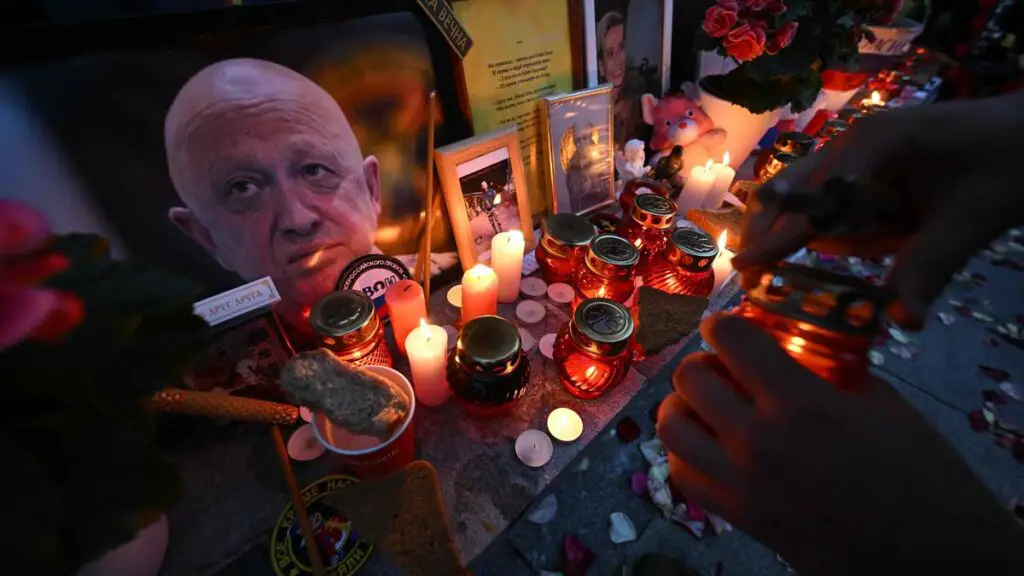Fragments of Hand Grenades Found in Bodies of Plane Crash Victims, Says Russian President Vladimir Putin
A memorial service was held in central Moscow on October 1st to commemorate the 40 days since the death of Yevgeny Prigozhin, the chief of the private mercenary group known as Wagner. Prigozhin, along with nine others, tragically lost their lives on August 23rd when their plane crashed during a flight from Moscow to Saint Petersburg. Russian President Vladimir Putin has now revealed new information surrounding the crash, stating that fragments of hand grenades were found in the bodies of the victims. His statement comes after experts investigating the crash found no evidence of external impact on the private jet.
It is important to note that there is no independent verification of Putin’s statement, casting some doubt on the validity of his claim. However, a preliminary intelligence assessment conducted by the United States concluded that the crash was caused by an intentional explosion. Western officials have also pointed to a long list of Putin’s adversaries who have been assassinated, further fueling suspicion. The Kremlin, however, has vehemently denied any involvement in the crash, labeling these allegations as “an absolute lie.”
A Russian investigation into the incident has been launched, but no official findings have been released at this time. Interestingly, Moscow rejected an offer from the jet’s manufacturer, Brazil’s Embraer, to assist in the inquiry. While Putin did not explicitly state the cause of the crash, his remarks strongly imply that a grenade explosion may have brought down the plane.
Prigozhin’s Rebellion and Controversial Legacy
The death of Yevgeny Prigozhin marks the culmination of a tumultuous chapter. In June, he led an aborted rebellion that posed the most significant challenge to Putin’s authority in his decades-long tenure. Prigozhin blamed the Defense Ministry’s leadership for mistakes made during the fighting in Ukraine and sought to oust them.
During the rebellion, Prigozhin’s mercenaries seized control of Russia’s southern military headquarters in Rostov-on-Don and embarked on a march towards Moscow. However, the mutiny abruptly ceased after a deal was struck, granting amnesty to the mercenaries in exchange for their compliance. They were given three options: retire from service, relocate to Belarus, or sign new contracts with the Defense Ministry.
Prigozhin, who was 62 years old at the time of his death, was a man of considerable influence and wealth. He owed much of his fortune to his close ties with Putin, dating back to the early 1990s. Prigozhin had earned the moniker “Putin’s chef” due to his lucrative catering contracts with the Kremlin.
In addition to his culinary ventures, Prigozhin founded the Wagner Group, a private military contractor. The Wagner Group has been involved in various conflicts, including Ukraine, Syria, and multiple African countries. At its peak, the group boasted tens of thousands of troops and played a significant role in the capture of the eastern Ukrainian city of Bakhmut in May, following months of intense combat.
Inquiry and Allegations
As the inquiry into the plane crash continues, Putin revealed that no testing had been conducted to determine if alcohol or drugs were present in the victims’ remains. However, during searches of Prigozhin’s office in St. Petersburg following the mutiny, authorities discovered a staggering 5 kilograms (11 pounds) of cocaine. This finding appears to be an attempt to tarnish Prigozhin’s reputation and further denigrate the fallen mercenary chief.
Putin acknowledged that Prigozhin had a “difficult fate” and had made “serious mistakes” in his life. While the exact nature of these mistakes remains undisclosed, it is evident that Prigozhin’s demise coincided with a period of personal and professional controversy.
Future of Wagner and Putin’s Intentions
Despite Prigozhin’s death, it seems that Putin has no intention of discontinuing the use of mercenary forces. In fact, he recently met with one of Wagner’s top commanders to discuss the takeover of the “volunteer units” fighting in Ukraine. This meeting serves as a clear indication that the Kremlin plans to sustain its reliance on mercenaries, even in the absence of Prigozhin’s leadership.
On October 6th, Putin announced that several thousand Wagner troops have already signed contracts with the Defense Ministry, ensuring their continued involvement in conflicts. This clearly demonstrates Putin’s commitment to maintaining a well-equipped and capable private military force.
As the investigation into the plane crash unfolds, it remains to be seen whether the truth behind the tragedy will come to light. Until then, speculation and allegations will continue to circulate, casting a shadow of uncertainty over the circumstances surrounding Yevgeny Prigozhin’s untimely demise.

